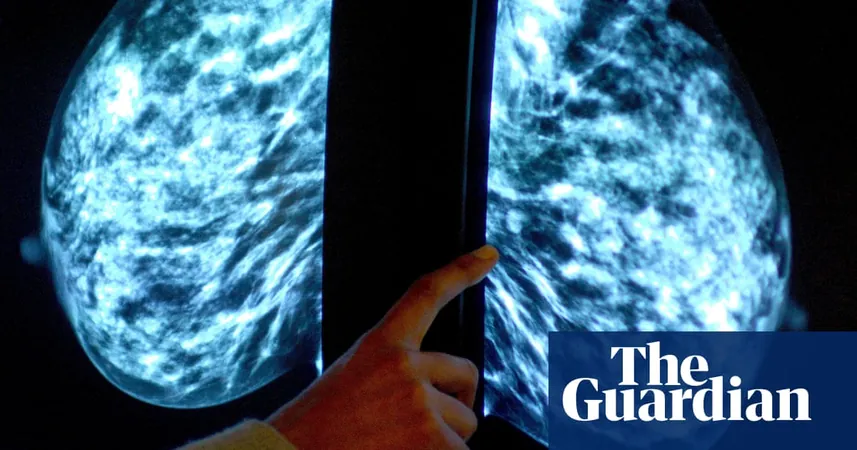
Groundbreaking Study Reveals AI Boosts Breast Cancer Detection in Real-World Screenings!
2025-01-07
Author: Wei Ling
Introduction
A recent study has revealed that the integration of artificial intelligence (AI) into breast cancer screening significantly enhances detection rates, marking the first real-world application of this technology in a nationwide screening program. Researchers assert that this advancement could revolutionize early cancer detection, particularly among asymptomatic women.
Background
While numerous prior studies have hinted at AI's potential in aiding healthcare professionals with identifying various types of cancers—including spotting abnormal growths in CT scans and detecting breast cancer in mammograms—most have been retrospective or involved smaller sample sizes. Until now, many did not capture the real-world effectiveness of AI in busy clinical settings.
Study Overview
This new groundbreaking study, which analyzed data from a staggering 461,818 women in Germany, was conducted between July 2021 and February 2023. Participants were part of a national screening initiative aimed specifically at women aged 50 to 69. The women underwent screenings that were independently assessed by two radiologists, with over half of them (260,739) receiving assistance from an AI tool to enhance accuracy.
AI Technology Implementation
The AI technology not only marks scans it identifies as “normal” but also issues a “safety net” alert for scans categorized as suspicious that were deemed unsuspicious by the radiologists. This alert mechanism highlights specific areas on the scan that warrant further examination, thereby ensuring critical information isn’t overlooked.
Results
In total, 2,881 women were diagnosed with breast cancer during the study. Remarkably, the AI-assisted group showed a 6.7% increase in detection rates. When factors like age and radiologist experience were accounted for, the difference ballooned to an impressive 17.6%, indicating that one additional case of cancer is identified for every 1,000 women screened with the aid of AI.
Recall Rates and Efficacy
Significantly, the study found that the recall rate for further investigation remained comparable between the two groups—indicating that the increased detection did not come at the cost of more false alarms. According to Prof. Alexander Katalinic from the University of Lübeck, “We improved the detection rate without increasing the harm for the women.”
Safety Net Effectiveness
In the AI group, the “safety net” was activated 3,959 times, leading to 204 diagnoses of breast cancer that might have otherwise gone unnoticed. The research indicates that, in the absence of expert review for scans marked as “normal,” the overall cancer detection rate would still be higher than traditional methods while reducing the recall rate.
Expert Insights
Stefan Bunk, co-founder of Vara—developers of the AI tool—highlighted the efficiency of AI in speeding up the analysis process, suggesting that fewer false positives lead to a lighter workload for radiologists.
Cautions and Challenges
Although experts are thrilled about the potential of AI in early cancer detection, there are still significant caveats. Dr. Kristina Lång from Lund University cautioned about the increase in detected in situ cancers—which are often slow-growing—potentially contributing to the overdiagnosis burden seen in breast cancer screenings. She emphasized the need for long-term follow-up studies to truly understand the clinical implications of AI integration in mammography.
Furthermore, the shortage of radiologists presents a real challenge—in the NHS, for instance, a recent census indicated a 29% shortfall. Dr. Katharine Halliday, president of the Royal College of Radiologists, echoed the sentiment that while AI tools could enhance diagnostic accuracy and efficiency, meticulous oversight remains critical to mitigate risks.
Conclusion
As healthcare continues to evolve, the implications of this study signal a pivotal shift towards the adoption of AI in cancer diagnostics. With further research and the necessary precautions, this technology has the potential to save lives and change the cancer screening landscape for the better. Stay tuned as we dive deeper into this transformative journey in medical advancement!

 Brasil (PT)
Brasil (PT)
 Canada (EN)
Canada (EN)
 Chile (ES)
Chile (ES)
 Česko (CS)
Česko (CS)
 대한민국 (KO)
대한민국 (KO)
 España (ES)
España (ES)
 France (FR)
France (FR)
 Hong Kong (EN)
Hong Kong (EN)
 Italia (IT)
Italia (IT)
 日本 (JA)
日本 (JA)
 Magyarország (HU)
Magyarország (HU)
 Norge (NO)
Norge (NO)
 Polska (PL)
Polska (PL)
 Schweiz (DE)
Schweiz (DE)
 Singapore (EN)
Singapore (EN)
 Sverige (SV)
Sverige (SV)
 Suomi (FI)
Suomi (FI)
 Türkiye (TR)
Türkiye (TR)
 الإمارات العربية المتحدة (AR)
الإمارات العربية المتحدة (AR)